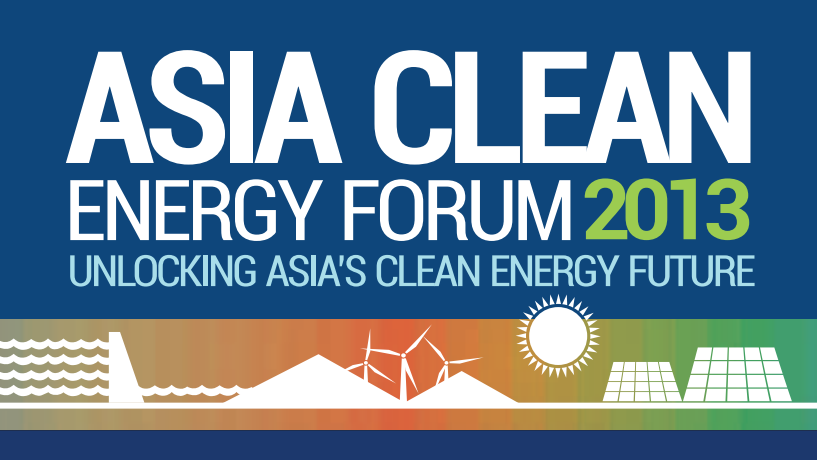During the ACEF, the ADB and the World Business Council for Sustainable Development (WBCSD) co-hosted a half-day forum on “Promoting private sector engagement in energy access”. This collaboration is part of the WBCSD’s engagement in the Energy for All (E4All) Partnership, which was formed by the ADB in 2009 to build platforms for cooperation, exchange, innovation, and project development for solutions to widespread energy poverty. The partnership brings together key stakeholders from business, finance, government, and NGOs with the aim of driving action towards a goal of providing energy access to 100 million people in Asia and the Pacific by 2015.
In his introductory remarks to some 80 attendees, Gil-Hong Kim, Director of the Sustainable Infrastructure Division in ADB’s Sustainable Development Department, underlined that Asia and the Pacific is the key battleground for energy poverty as half the world’s population lives in the region. In developing Asia, 628 million people have no access to electricity, while 1.8 billion people still rely on traditional biomass for cooking. Mr. Kim spoke about the Bank’s strategy in this domain, underlining that since 2008, the ADB has invested a total of USD 3.8 billion in energy access related projects across Asia-Pacific, and provided modern energy to more than 67 million people.
I delivered an introductory presentation, highlighting the WBCSD’s views on the business role and opportunity in enabling access to clean, reliable and affordable energy, in line with the key messages and learnings from our ongoing Access to Energy workstream (chaired by GDF Suez and Schneider Electric).
The forum was split into 3 consecutive sessions on the following topics:
- SMEs and energy access;
- the role of large companies;
- financing private sector initiatives.
I moderated the session on large companies, which featured two WBCSD members: Jocot de Dios (CEO, GE Philippines) and Franziska Zimmermann (Director Government Affairs and Strategic Relations, Philips ASEAN region). GE and Philips spoke about what they bring to the table in terms of technical, managerial, and operational expertise; and about some of their initiatives for bringing innovative and affordable technologies to market. GE is working toward engaging enabling technologies (for ex. gas engines and turbines) to provide comprehensive and efficient solutions to distributed power (most notably via biomass gasifiers and microgrids). For its part, Philips spoke about how it is catering to the world’s needs for “more light, more energy-efficient light, and digital light” by developing solar LED lighting solutions.
The E4All partners took advantage of the forum to publish a 2-page brochure outlining the value proposition of the Energy for All Partnership for business. In essence, E4All can help companies in:
- Identifying and implementing innovative business models, including PPPs, with
- Developing and deploying appropriate instruments for financing and risk mitigation
- Advocating supportive enabling frameworks to policymakers
- Facilitating connections across the energy access value chain (distributors, suppliers, NGOs, governments entities, etc.) to develop, finance and implement access to energy solutions
The private sector forum was followed by an equally well-attended investor forum, which was designed to provide matchmaking opportunities between companies (incl. social enterprises) working on energy access and investors, incl. impact investors and multilateral institutions like the ADB, in view of monetizing their value proposition and sustaining their operations commercially.
During the ACEF, I also participated in a 90-minute panel session on “Financing Mechanisms for Sustainable Energy for All” that discussed how public and development finance mechanisms can attract and leverage additional private sector investment in energy access. It also touched upon the financing mechanisms that can be adapted to use existing resources more efficiently (most notably via output-based aid / results-based financing).
I shared our main messages on this specific topic, which we had compiled in chapter 6 of our report “Business solutions to enable energy access for all”. Furthermore, I highlighted 3 examples of WBCSD members increasing their contribution to providing access to energy through their own innovative investment funds that support smaller enterprises:
- ERM: Low Carbon Enterprise Fund (LCEF) – provides seed capital at reasonable interest rates, free technical and management support, as well as the opportunity to network with other partners. Purvi Sapre, Investment Director of the LCEF, presented ERM’s work in detail during the abovementioned investor forum.
- GDF SUEZ: Rassembleurs d’Energies program –provides socially responsible investment, donations, technical and managerial assistance.
- Schneider Electric: Business, innovation & people at the base of the pyramid program (BipBop) – includes an investment fund to support energy entrepreneurs for low-income markets.
The Asia Clean Energy Forum website (includes links to presentations, photos, Twitter feeds, etc.).


